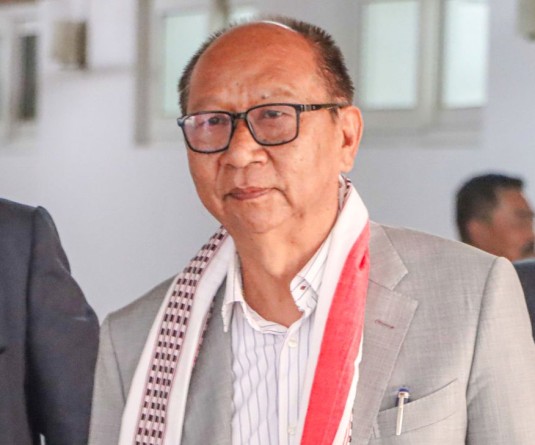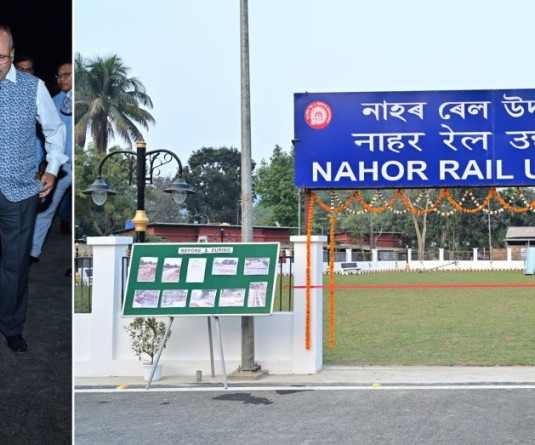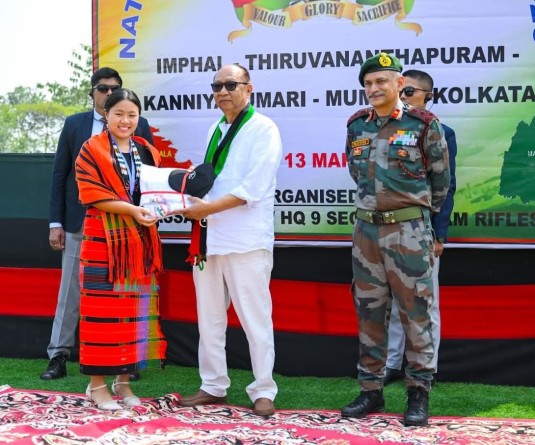
Mizoram University & Patkai Christian College’s Depts of Mass Comm hold inaugural Lecture Series
Aizawl/Patkai, November 17 (MExN): “Quality ‘shoe leather journalism’ will survive the test of time. We cannot have a media that paddles lie and function without credibility,” asserted award winning journalist and author Teresa Rehman on Tuesday.
Rehman was delivering the inaugural lecture for the ‘Media Talk,’ a lecture series jointly organized by Department of Mass Communication, Mizoram University and Department of Multimedia and Mass Communication, Patkai Christian College (Autonomous), which kicked off on November 16, coinciding with the National Press Day.
Speaking on the theme ‘Journalism in The Post-Truth Era’, Rehman impressed upon the reality of post truth era in journalism stating how media ecosystem has experienced seismic changes with proliferation of fake news and misinformation where algorithms and the number of clicks matter without any concern for integrity and credibility, a press release from the organiser informed.
“Digital media has revolutionized the access to news. New forms of journalism like new media and citizen journalism have given a platform to everybody who owns a mobile phone which can both be beneficial and detrimental,” Rehman added hinting at ‘filter bubbles’ in digital media platforms.
Dribbling the idea of opinions as opposed to facts in news, Rehman, the author of books, The Mothers of Manipur and Bullet Proof, categorically mentioned that a complex political communication environment leads to a perplexing post truth world giving emotions and opinions a go ahead in influencing people way more than facts.
Cardinal rules of journalism to stay
In this context, she argued that the core value of journalism will always remain despite changing circumstances and underscored the importance of keeping one’s feet firmly on the ground.
“I strongly believe there are certain cardinal rules and old fashioned values of journalism which will never go out of style,” she affirmed.
Rehman recalled being shocked when she first heard of fake news. “For us news is sacred, how can someone write fake news!,” she exclaimed.
To this end, she stressed that the aged-old way of going to the field and gathering as many information, meeting people and asking questions is and should be the way of reporting.
The way to report is to think critically and not to take everything on face value. One should be able to think objectively and do good stories, she added.
‘Demystifying conflict reporting’
Meanwhile, Rehman, a two-time recipient of Ramnath Goenka Excellence in Journalism Awards for reporting in North East among others, described her approach to reporting as ‘demystifying conflicts and humanizing stories.”
“To understand a conflict situation we need to listen to the voices of the people. It is important that stories are told without being judgmental. The words and wisdom of the people will lead us to better understanding of the way conflict affects our lives,” she added.
Sharing her experience as a combat journalist reporting on Northeast India, she stated: ‘The real test of a journalist in a heterogeneous region like Northeast India lies in sculpting a path that can tell real objective stories’.
‘North East a paradise for journalist’
The journey into the heartlands of North East was exciting but never easy, Rehman recalled.
However, she emphasized that a “sensitive region like North East calls for having insights on the socio-political environment of the region that is steeped in identity and ethnic politics.”
There are stories lying in the backyard and one have to keep eyes and ears open. The region is a paradise for journalist and there are many stories waiting to be told, she added.
‘Solution journalism’
Rehman also elaborated on a new genre called the ‘Solution journalism,’ dealing with finding solutions to problems.
These are stories that by credible evidence explains how, why and if responses to stories are working or not, she explained.
Unaware of the new genre, Rehman said that one of her story about a farmer in Nagaland was identified as ‘Solution journalism’.
Train one’s mind to dig deeper into understanding what could be a probable solution, she batted, adding that this can help policy makers to consider the findings from the report.
Advising the students, Rehman opined while the young minds will find newer ways to tell stories, they should keep in mind that ‘content is king.’
“It doesn’t matter what gadgets one use. A solid content will stand the test of time,” she affirmed.
Earlier, Prof V Ratnamala of Mizoram University welcomed the speaker and participants while the session concluded with an interaction round and vote of thanks by Dr Dakter Esse from Patkai Christian College (Autonomous).






